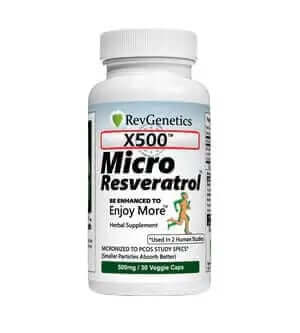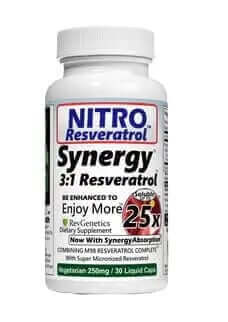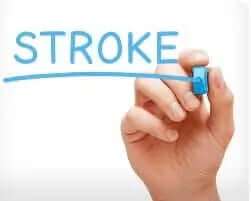Resveratrol: Revolutionary Fat-Burning Hormone Booster Proven in Human Clinical Study
Groundbreaking research from Albert Einstein College of Medicine reveals how resveratrol dramatically increases adiponectin, the body's natural fat-burning hormone, by an impressive 53% in just 28 days. This comprehensive guide explores the science behind resveratrol's remarkable ability to transform metabolism, reduce inflammation, and enhance insulin sensitivity through clinical evidence.
What Makes Resveratrol a Game-Changer for Metabolic Health
Imagine discovering a natural compound that could unlock your body's hidden potential to burn fat more efficiently while simultaneously reducing inflammation and improving insulin sensitivity. That's exactly what researchers at Albert Einstein College of Medicine found when they studied resveratrol in human subjects. This powerful polyphenol, naturally found in red grapes, berries, and peanuts, has emerged as one of the most promising compounds for metabolic optimization and healthy aging.
The journey of resveratrol from laboratory curiosity to clinically proven metabolic enhancer represents a significant breakthrough in nutritional science. Unlike many supplements that rely solely on animal studies or theoretical benefits, resveratrol has demonstrated its effectiveness in rigorous human clinical trials, offering real hope for those seeking natural solutions to metabolic challenges.
The Science Behind Resveratrol's Fat-Burning Properties
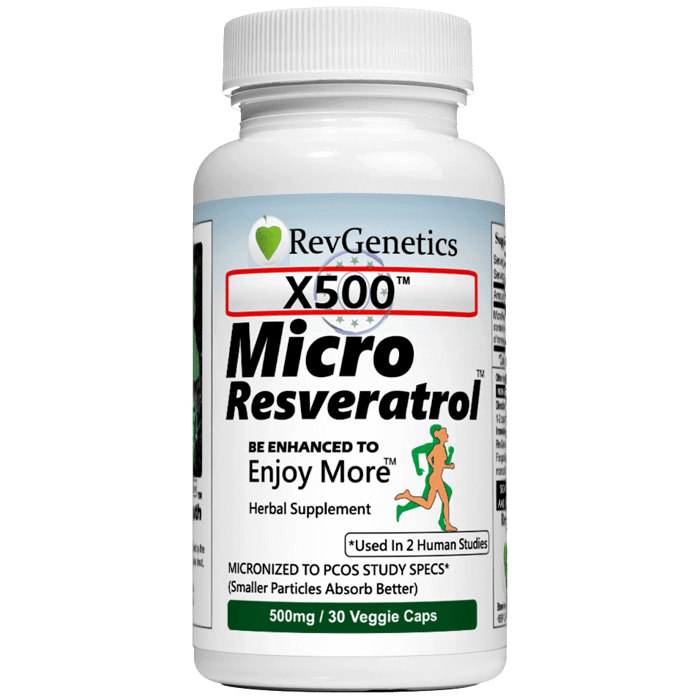 Clinical-grade X500 Resveratrol: The exact formulation used in the Albert Einstein College of Medicine study
Clinical-grade X500 Resveratrol: The exact formulation used in the Albert Einstein College of Medicine study
The clinical study conducted at Albert Einstein College of Medicine employed a gold-standard randomized, double-blind, placebo-controlled methodology. Participants received 2 grams of pure resveratrol daily (equivalent to four X500 capsules) for 28 days. This dosage was carefully selected based on preliminary research indicating optimal bioavailability and therapeutic effect.
Key Study Parameters and Methodology
The research team implemented comprehensive metabolic assessments including:
- Hepatic insulin sensitivity measurements to evaluate liver function and glucose metabolism
- Peripheral insulin sensitivity testing to assess how effectively muscles and tissues respond to insulin
- Muscle tissue biopsies to examine cellular changes at the microscopic level
- Subcutaneous adipose tissue analysis to directly measure fat cell behavior and hormone production
These extensive measurements were conducted both before and after the 28-day supplementation period, providing clear before-and-after comparisons that revealed resveratrol's remarkable effects on human metabolism.
Breakthrough Results: How Resveratrol Transforms Your Metabolism
The results of this groundbreaking study exceeded even the researchers' optimistic expectations. After just four weeks of resveratrol supplementation, participants experienced transformative metabolic improvements that typically require months of strict dieting or intensive exercise to achieve.
1. Dramatic Increase in Fat-Burning Hormone Adiponectin
The most striking finding was a 53% increase in adiponectin levels within fat tissue. Adiponectin serves as your body's master regulator of fat metabolism, signaling cells to burn stored fat for energy rather than storing additional calories. This hormone plays crucial roles in:
- Accelerating the breakdown of fatty acids for energy production
- Enhancing mitochondrial function for improved cellular energy
- Reducing fat accumulation in liver and muscle tissue
- Improving overall metabolic flexibility
2. Enhanced Insulin Sensitivity Without Dietary Changes
Participants showed a 22% improvement in glucose uptake, indicating significantly enhanced insulin sensitivity. This improvement occurred without any changes to diet or exercise habits, suggesting that resveratrol activates metabolic pathways similar to those triggered by caloric restriction. This finding offers particular hope for individuals struggling with insulin resistance or pre-diabetes who find traditional dietary interventions challenging to maintain.
3. Powerful Anti-Inflammatory Effects
The study revealed dramatic reductions in inflammatory markers:
| Inflammatory Marker | Reduction Percentage | Health Significance |
|---|---|---|
| TNF-alpha (TNFa) | 68% | Reduced chronic inflammation and metabolic dysfunction |
| Interleukin-6 (IL6) | 52% | Lower risk of insulin resistance and cardiovascular issues |
| PAI-1 in adipose macrophages | Significant reduction | Improved blood flow and reduced clotting risk |
These reductions in inflammatory cytokines represent a fundamental shift in how fat tissue behaves, transforming it from a source of inflammation to a metabolically active tissue that supports overall health.
Understanding Resveratrol's Mechanisms of Action
Resveratrol works through multiple sophisticated pathways to achieve its remarkable effects. Understanding these mechanisms helps appreciate why this compound produces such comprehensive metabolic improvements.
Activation of SIRT1 and Metabolic Sensors
Resveratrol activates SIRT1, often called the "longevity gene," which triggers a cascade of beneficial metabolic changes. This activation mimics the effects of caloric restriction at the cellular level, promoting:
- Enhanced mitochondrial biogenesis for increased energy production
- Improved fat oxidation and reduced fat storage
- Better cellular stress resistance and longevity
- Optimized nutrient sensing and metabolic flexibility
AMPK Activation for Energy Balance
Resveratrol also activates AMPK (AMP-activated protein kinase), your body's master energy sensor. This activation leads to:
- Increased glucose uptake by muscle cells
- Enhanced fat burning during rest and activity
- Improved mitochondrial efficiency
- Better overall energy homeostasis
Real-World Applications: How to Harness Resveratrol's Benefits
The clinical study provides clear guidance on how to effectively use resveratrol for metabolic enhancement. The research protocol offers a proven framework that individuals can follow to potentially replicate these impressive results.
Optimal Dosing Strategy Based on Clinical Evidence
The study participants took their resveratrol in a specific pattern that maximized absorption and effectiveness:
- Morning dose: 2 capsules (1000mg) with breakfast
- Evening dose: 2 capsules (1000mg) with dinner
- Total daily intake: 2000mg pure trans-resveratrol
- Duration: Minimum 28 days for measurable metabolic changes
This divided dosing strategy ensures consistent blood levels throughout the day, maximizing resveratrol's metabolic benefits while minimizing any potential digestive sensitivity.
Enhancing Resveratrol Absorption and Effectiveness
To maximize the benefits of resveratrol supplementation, consider these evidence-based strategies:
- Take with food: The study showed resveratrol can be taken with meals, which may enhance absorption and reduce any potential stomach sensitivity
- Maintain consistency: Daily supplementation without gaps ensures steady therapeutic levels
- Consider complementary nutrients: Some research suggests combining resveratrol with quercetin or piperine may enhance bioavailability
- Stay hydrated: Adequate water intake supports optimal nutrient transport and cellular function
Who Can Benefit Most from Resveratrol Supplementation
While resveratrol offers broad metabolic benefits, certain individuals may experience particularly transformative results based on the clinical findings:
Individuals with Metabolic Challenges
Those experiencing insulin resistance, pre-diabetes, or metabolic syndrome may find resveratrol especially beneficial. The 22% improvement in glucose uptake demonstrated in the study suggests significant potential for improving metabolic health markers without drastic lifestyle changes.
People Seeking Natural Weight Management Support
The dramatic 53% increase in adiponectin levels makes resveratrol particularly appealing for individuals looking to optimize their body composition naturally. This hormone boost can help the body more efficiently utilize stored fat for energy.
Adults Concerned About Inflammation and Aging
The powerful anti-inflammatory effects demonstrated in the study suggest resveratrol may help address "inflammaging" - the chronic low-grade inflammation associated with aging and various health challenges.
Safety Profile and Considerations
The clinical study at Albert Einstein College of Medicine provides reassuring data about resveratrol's safety profile. Participants tolerated the 2-gram daily dose well, with no significant adverse effects reported. However, as with any supplement, certain considerations apply:
- Consult healthcare providers: Especially important for individuals taking medications or managing chronic conditions
- Start gradually: Some people may benefit from starting with a lower dose and increasing gradually
- Quality matters: Choose pharmaceutical-grade resveratrol from reputable sources to ensure purity and potency
- Monitor your response: Keep track of energy levels, metabolic markers, and overall wellbeing
The Future of Resveratrol Research and Applications
This groundbreaking study represents just the beginning of our understanding of resveratrol's potential. Ongoing research continues to explore:
- Optimal dosing strategies for different health goals
- Synergistic combinations with other natural compounds
- Long-term effects on healthspan and longevity
- Applications for specific metabolic conditions
The collaboration between academic institutions and quality supplement manufacturers, as demonstrated in this study, paves the way for continued advancement in our understanding of how natural compounds like resveratrol can support human health and vitality.
Conclusion: Your Path to Metabolic Transformation
The clinical evidence from Albert Einstein College of Medicine offers compelling proof that resveratrol represents a scientifically validated approach to metabolic enhancement. With its ability to increase fat-burning hormones by 53%, improve insulin sensitivity by 22%, and dramatically reduce inflammation, resveratrol stands out as a transformative supplement for those seeking to optimize their metabolic health naturally.
Whether you're looking to enhance your body's fat-burning capabilities, improve insulin sensitivity, or reduce chronic inflammation, the research suggests that resveratrol offers a proven path forward. The key lies in choosing high-quality supplements, following evidence-based dosing protocols, and maintaining consistency in your supplementation routine.
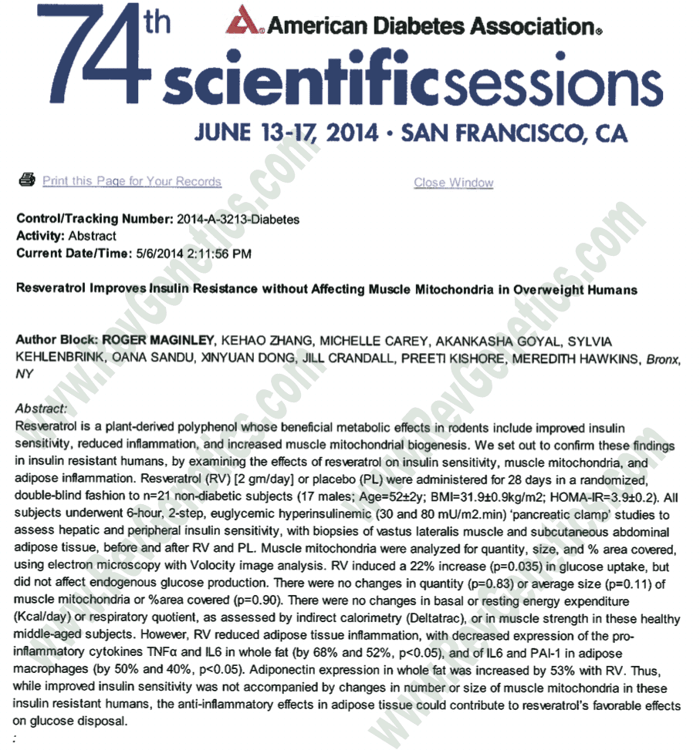 Official clinical study abstract from Albert Einstein College of Medicine documenting resveratrol's metabolic benefits
Official clinical study abstract from Albert Einstein College of Medicine documenting resveratrol's metabolic benefits
Frequently Asked Questions About Resveratrol and Fat-Burning Hormones
How quickly can I expect to see results from resveratrol supplementation?
Based on the clinical study at Albert Einstein College of Medicine, significant metabolic improvements were observed after 28 days of consistent supplementation with 2 grams of resveratrol daily. Participants experienced a 53% increase in adiponectin (fat-burning hormone) and a 22% improvement in glucose uptake within this timeframe. While individual results may vary, maintaining consistent daily supplementation for at least four weeks appears optimal for experiencing measurable benefits.
What is adiponectin and why is a 53% increase significant?
Adiponectin is a crucial hormone produced by fat cells that regulates glucose levels and fatty acid breakdown. Higher adiponectin levels are associated with improved insulin sensitivity, enhanced fat metabolism, and reduced inflammation. A 53% increase is remarkably significant because most interventions, including exercise and weight loss, typically produce much smaller increases. This dramatic boost means your body becomes substantially more efficient at burning stored fat for energy and maintaining healthy blood sugar levels.
Can I take resveratrol with my current medications?
While the clinical study showed resveratrol to be well-tolerated with no significant adverse effects, it's essential to consult with your healthcare provider before adding any supplement to your routine, especially if you're taking medications. Resveratrol may interact with blood thinners, NSAIDs, and certain other medications. Your doctor can evaluate potential interactions and help determine if resveratrol is appropriate for your specific health situation.
Is 2 grams of resveratrol daily safe for long-term use?
The clinical study used 2 grams daily for 28 days with excellent safety results. While this study duration provides strong evidence for short-term safety, long-term studies at this dosage are still ongoing. Many people successfully use resveratrol long-term at various doses. Starting with the clinically proven protocol and monitoring your response with your healthcare provider ensures you're using resveratrol safely and effectively for your individual needs.
How does resveratrol compare to prescription medications for metabolic health?
Resveratrol works through different mechanisms than most prescription medications, activating natural metabolic pathways like SIRT1 and AMPK. The 22% improvement in glucose uptake shown in the study is comparable to some diabetes medications, but resveratrol additionally offers anti-inflammatory benefits and increased fat-burning hormone production. Rather than replacing medications, resveratrol may serve as a complementary approach to support overall metabolic health. Always work with your healthcare provider to determine the best approach for your situation.
Should I take resveratrol with food or on an empty stomach?
The clinical study protocol had participants take resveratrol with meals - two capsules with breakfast and two with dinner. Taking resveratrol with food may enhance absorption and reduce any potential digestive sensitivity. The fat content in meals can particularly help with the absorption of this fat-soluble compound. This approach also makes it easier to remember your doses and maintain the consistency crucial for optimal results.
Can resveratrol help with stubborn belly fat?
The study's findings suggest resveratrol may be particularly effective for abdominal fat reduction. The 53% increase in adiponectin specifically targets visceral fat metabolism, and the significant reduction in inflammatory markers (68% reduction in TNF-alpha) addresses one of the key factors in stubborn belly fat accumulation. Additionally, the improved insulin sensitivity helps prevent further fat storage in the abdominal area, creating a comprehensive approach to addressing this common concern.
What quality factors should I look for in a resveratrol supplement?
Choose resveratrol supplements that specify "trans-resveratrol" content, as this is the bioactive form used in clinical studies. Look for products that provide third-party testing results for purity and potency. The supplement should be manufactured in GMP-certified facilities and free from unnecessary fillers or artificial ingredients. Pharmaceutical-grade resveratrol, like that used in the Albert Einstein College study, ensures you're getting the same quality that produces clinical results.
Can I get enough resveratrol from food sources alone?
While resveratrol occurs naturally in red grapes, berries, and peanuts, achieving the therapeutic dose used in the clinical study (2 grams daily) through diet alone is virtually impossible. You would need to consume hundreds of pounds of grapes or thousands of glasses of red wine daily to match the study dosage. This is why concentrated supplements are necessary to achieve the metabolic benefits demonstrated in clinical research. Food sources can complement supplementation but cannot replace it for therapeutic effects.
Will resveratrol interfere with my exercise routine or athletic performance?
Research suggests resveratrol may actually enhance exercise benefits rather than interfere with them. By improving mitochondrial function, increasing fat oxidation, and reducing inflammation, resveratrol can support better energy production and recovery. The improved insulin sensitivity and glucose uptake demonstrated in the study may also enhance athletic performance by improving how your muscles utilize energy. Many athletes and fitness enthusiasts successfully combine resveratrol supplementation with their training routines for synergistic benefits.
Note: These statements have not been evaluated by the Food and Drug Administration. Resveratrol supplements are not intended to diagnose, treat, cure, or prevent any disease. Always consult with a qualified healthcare professional before starting any supplement regimen.

